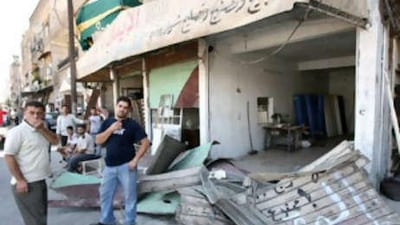BEIRUT // The accusation that key Lebanese political figures have been assisting the al Qa'eda-inspired militant group, Fatah al Islam, has roiled Beirut's political class as rivals accuse one another of supporting the group.
The claim was made by the daughter of Fatah al Islam's leader who said the group received financial support from a political party run by Lebanon's top Sunni politician - detailed in two articles in the Al Akhbar newspaper. It set off a wave of controversy in Beirut that quickly took on sectarian overtones. One prominent Sunni cleric reportedly implicated in supporting the group immediately vowed to sue the newspaper for slander although no court documents have yet been filed.
The claim followed a televised confession by members of Fatah al Islam - a Sunni extremist group considered responsible for several bombings and a three-month siege of the Nahr al Bared refugee camp that left hundreds dead and thousands homeless - who have been detained by Syria, admitting involvement in a Sept 27 car bombing in Damascus that killed 17 people. The pro-Syrian opposition in Lebanon led by the militant Shiite Hizbollah has long accused its Sunni rivals in the Future Movement - led by Saad Hariri - of supporting Fatah al Islam as well as other al Qa'eda-inspired Sunni militants in Lebanon. The Lebanese government - as well as Mr Hariri and his allies - have countered that the group was actually supported by Syrian intelligence in a bid to destabilise northern Lebanon.
But the issue took on new significance on Friday when Syrian television broadcast the confessions of several alleged Fatah al Islam members, who took responsibility for the Sept 27 bombing in Damascus. Wafa Abssi, the daughter of the group's fugitive leader Shaker al Abssi, was also shown alleging support for the group came from Mr Hariri and the Future Movement. On Friday and Saturday, Al Akhbar released an investigation that cited Syrian intelligence sources claiming they had found significant evidence that support for the group also came from conservative clerics in northern Lebanon, as well as from more mainstream Lebanese political figures.
Ms Abssi said her father had told her that the Future Movement supported him through prominent Salafist clerics in Tripoli. Syrian sources later named Dai al Islam al Shahal, a key Salafi leader in northern Lebanon, as a key supporter of the group. Bilal Dickmak, a Salafi cleric with close ties to Mr Shahal, rejected the accusations as political posturing intended to isolate Lebanon's Sunni community.
"I never supported Fatah al Islam, not financially nor mentally and the accusation that appeared on Syrian TV is nothing but a cheap campaigning battle for the coming elections," he said. "I knew Fatah al Islam during our involvement in negotiations during the Nahr al Bared battle between them and the Lebanese army. Plus we all know that Shaker al Abssi is a Syrian intelligence creation." Mr Shahal could not be reached for comment but reportedly plans to sue Al Akhbar for spreading false allegations against him.
Musbah al Ahdab, an MP and a Future Movement supporter, said the Syrian broadcast is a campaign designed to weaken Lebanon's position in upcoming joint security negotiations. Ziad Baroud, the interior minister, and Elis Murr, the defence minister, are due to meet Syrian counterparts soon to discuss security, Mr Musbah said, and the Syrians will use this claim as a pretext to allow their intelligence services to operate freely inside Lebanon as part of a "war on terror".
Sunni parties led by Future were engaged in a nearly two-year power struggle with the Hizbollah-led opposition, dominated by Shiite Muslims for control of Lebanon. Although opposition militias humbled Future in clashes in May, Hizbollah and its pro-Syrian allies repeatedly claimed that Future was arming and funding Islamic radicals in exchange for their support against Hizbollah. But few groups materialised during the May clashes, effectively ending the rumours of a substantive link between the pro-government parties and Sunni militants, at least until Friday.
Mr Hariri, who accuses Syria of murdering his father, the former prime minister Rafiq Hariri, in a 2005 car bombing, has always denied any links to radicals and counts the United States and France as among his stoutest supporters. Although Lebanon's Sunni community has few historic links to militancy, small pockets around the country have harboured radicals in the past and Lebanon's thirteen Palestinian refugee camps have seen a significant rise in militancy and sent hundreds of fighters to oppose the US-led occupation of Iraq. Fouad Siniora, the Lebanese prime minister, issued a statement on Saturday denouncing the Syrian claims of Lebanese involvement in the bombing.
mprothero@thenational.ae

